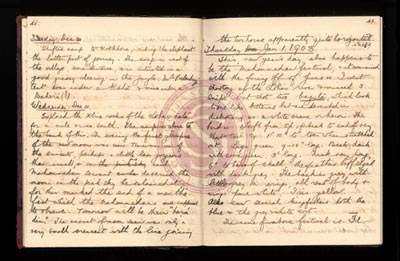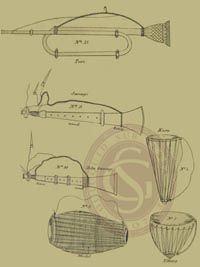Celebration
 |
|
Diary (1902-1904): 30th December 1902-1st January 1903 (p.40-41) [LDGSL/348/2/3]. Click to enlarge. |
Religion played a large part in the lives of the Indians through whose villages Fermor was travelling. Whenever he mentions a specific Indian by name, their religious affiliation is almost always clarified; for example when listing his servants they are described as ‘Madat Ali, a Musalman’ (Muslim) or ‘Mohan Lal, a Hindu’ (14th-17th April 1903), and Tata, running Empress Cotton Mills, is ‘a Parsi’ (19th October 1903). Naturally therefore, religious festivals were big events.
During Fermor’s first field work season, the end of Ramadan fell on New Year’s Eve:
[A]s each Mahommedan servant descried the moon in the pink sky he salaamed it for this marked the end of a month’s fast which the Mahommedans are supposed to observe.
31st December 1902
New Year’s Day was, consequently, Eid al-Fitr, the religious holiday occurring after the end of Ramadan. In Kotkhera (Kotkhedi) in 1903, this ‘commenced with the firing off of guns’. During his second season this festival occurred on the 21st December, in celebration of which Fermor was given a dish which is still eaten at Eid in the Indian subcontinent today:
[F]or breakfast [...] the seasonable dish composed of Sewain (a material in between macaroni and vermicelli in coarseness) chhuhara (dry date) raisins, almonds, sugar and milk and served hot.
21st December 1903
 |
| Some traditional musical instruments. Clockwise from top: Turi, a brass trumpet; Kara, a conical drum beaten with a stick in one hand and the fingers of the other; Tikara, a drum always used in pairs; Madol, beaten with one hand at either end; Tota Sanayi, made of wood with a brass mouthpiece; Sanayi, made of wood with brass at either end. [Montgomery Martin, The History, Antiquities, Topography and Statistics of Eastern India. Vol.III – Puraniya, Ronggopoor, and Assam, London: Wm.H. Allen & Co., 1838 (pl.VII).] |
The principal Hindu festival referenced in the diary is Holi. He describes it as going on for several days in his first season, with the first day, in his view, containing ‘nothing but a little very poor dancing in evening by a man attired as a woman’, ‘a tall pile of sticks which produced a splendid blaze’, and ‘ drum beating all night’ (13th March 1903). Fermor seemed to view such religious festivals primarily as pretexts for the Indians to come to him for money; in his article for the Royal College of Science magazine, he writes, ‘the servants, on their return from prayer, came in a body bringing flowers and salaamed us’ (Fermor 1903, p.242) on Eid al-Fitr, with the aim of being given money. He goes on, ‘[t]he Hindus will take the opportunity of extracting money after the same fashion when the Holi [...] takes place’. This did indeed happen:
[O]n March 16 the dancer and his band and the women came the former to dance and the latter to sing for money. Gave the band Rs2 [two Rupees] and the women Rs2 and the raja’s brother’s son Rs1. Then up came a band and dancer and women from Berkesar[?]. Had to give Rs2.
18th March 1903
Fermor’s own celebration of Christmas, in the non-Christian culture of rural India, was unsurprisingly low-key. He was at least joined by a colleague, Mr Vredenburg, on his first Christmas abroad, with whom he spent the day shooting and fishing. In the evening the two of them sat round a fire ‘with about 20 natives and listened to their songs accompanied by beating on an empty oil-can, which served as a drum’ (25th December 1902). Later they ‘continued on V’s harmonium in his tent’, perhaps singing carols or other songs reminding them of home. His second Christmas seems to have been somewhat less successful. Despite having a special dinner of ‘goat and plum-pudding’, the day consisted of a ‘badly arranged’ hunt, followed by an evening of Indian dancing and acting where ‘the dialogue was Marathi [so he] could not understand anything except when they broke into Hindustani’ (25th December 1903).